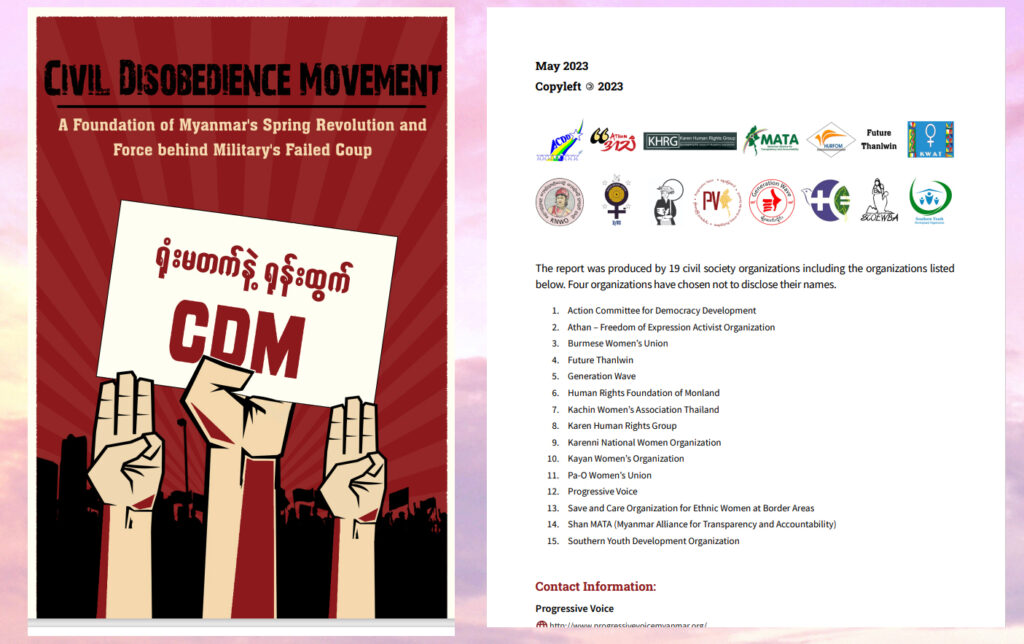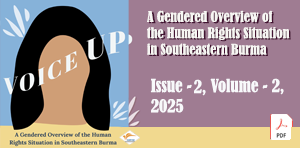19 Civil Society Organizations release a new report, “Civil Disobedience Movement: A Foundation of Myanmar’s Spring Revolution and Force behind Military’s Failed Coup”
May 26, 2023
On May 25, 2023, 19 Civil Society Organizations, including the Human Rights Foundation of Monland HURFOM as a co-author, joined hands together on the release of a new report, “Civil Disobedience Movement: A Foundation of Myanmar’s Spring Revolution and Force behind Military’s Failed Coup” and called for the support for the CDM Activists.
- The Civil Disobedience Movement (CDM) in Myanmar has evolved from a reaction, or a withdrawal from and non-cooperation with the military, to a movement that is building a federal democracy through people power that is stronger, more diverse and inclusive than any previous people’s movements in Myanmar.
- The international community must reassess their support for the Spring Revolution. This requires challenging conventional notions of a Human Rights Defender so that it can evolve to recognize and support the CDM.

The world must recognize and provide political and material support to the CDM in their heroic struggle for democracy and human rights, and to end ongoing military tyranny despite the atrocities they face, said 19 Myanmar civil society organizations in a new report released today.
“Civil Disobedience Movement: A Foundation of Myanmar’s Spring Revolution and Force behind Military’s Failed Coup” highlights the evolution of the CDM from a movement that has succeeded in preventing the Junta from its illegal attempt to grab power to one that underpins the governing entities of the resistance to construct a federal democratic Myanmar that guarantees inclusivity, equality and justice for all.
Following consultation with members of the CDM and human rights defenders in July and August 2022, over 20 interviews with members of the CDM and human rights defenders were conducted for this report to offer a snapshot of the current situation of the CDM, their aspiration, and on-going needs.
The CDM was the first expression of resistance to the attempted coup and is a key pillar of the Spring Revolution.
Within the first days of the Myanmar military’s attempted coup on February 1 2021, tens of thousands of public sector workers from the lower rungs of the civil service through to the very top, were on strike, withholding their labor from public administration and governance that effectively prevented the military from seizing control.
Two years later, the CDM continues to be active and resolute, despite the hardships, violence, and sacrifice that its members and families have endured and thus caused the Junta’s coup attempt to fail.
The report details the unprecedented achievements of the CDM including in its inclusivity, diversity and intersectionality, and formation of inter-ethnic solidarity in a country that has been at the helm of military’s divide and rule strategy to sow ethic and religious divisions for generations.
Myanmar’s governing entities of the resistance, including the national Unity Government (NUG), are underpinned by the CDM, as many play leading roles in NUG ministries working to provide essential social services to the Myanmar public. For example, CDM doctors and nurses have continued to treat people clandestinely and privately, while educators are establishing universities and continuing teaching in community-initiated schools in liberated areas and ethnic resistance-controlled areas. Railway department officials are planning to restructure the running of the railway system and are establishing interim railway administration body.
Amid the successes of the CDM in crippling the Junta’s ability to take control, they have faced grave threats and challenges. “CDMer” as they are often referred to, have been killed, arrested, subjected to sexual assault, tortured and evicted from government housing.
While sustaining the CDM is essential for the Myanmar’s Spring Revolution, many donors have been hesitant to fund CDMers, labeling their participation in the Spring Revolution as political.
The report urges the international community to reassess their view on the CDM and recognize them as human rights defenders according to internationally recognized definition outlined in Article 1 of the UN Declaration on Human Rights Defenders, which states:
“Everyone has the right, individually and in association with others, to promote and to strive for the protection and realization of human rights and fundamental freedoms at the national and international levels.”
Su, a teacher who has been taking part in the CDM said: “Despite the harassments and threats, we are determined to resist the Myanmar military until the revolution succeeds. Our struggle is not only to defend our own rights but the rights of new generations to come so that they may enjoy the freedom that has been robbed from us by the tyranny of the military.
“We are determined to survive and continue our work to build a new federal democratic Myanmar.”
Khin Ohmar, Founder and Chairperson of Progressive Voice said: “There is a strong sense in Myanmar that the international community is not providing enough support for the CDMers. The CDMers have been a key pillar of the Spring Revolution, fighting for a future federal democratic Myanmar that would put an end to one of the most violent military institutions in the world. If not for their clear stand and sacrifices, Myanmar could have fallen under military control, dragging us back to the dark times of the Than Shwe regime. After two years, the military’s attempted coup has failed.
“The CDMers are striving to protect and realize human rights and fundamental freedoms as defined in the UN Declaration of Human Rights Defenders. The international community must reassess their perception and the way they are supporting the Spring Revolution by recognizing CDMers as human rights defenders according to international definition.
Benny Agus Prima, Human Rights Defenders Programme Manager of FORUM-ASIA said: “CDMers, who peacefully protest against military’s atrocities, serve as the living embodiment of human rights defenders. Persistent support, in all its forms, is crucial to maintaining and sustaining the movement. The strategy of lurching from one crisis to the next is far from ideal as the complexity of the situation escalates with time. We need to prevent this Spring Revolution from becoming merely a ‘spring dream’.”
Download full report in English | Burmese
The report was produced by 19 civil society organizations including the organizations listed below. Four organizations have chosen not to disclose their names.
- Action Committee for Democracy Development
- Athan – Freedom of Expression Activist Organization
- Burmese Women’s Union
- Future Thanlwin
- Generation Wave
- Human Rights Foundation of Monland
- Kachin Women’s Association Thailand
- Karen Human Rights Group
- Karenni National Women Organization
- Kayan Women’s Organization
- Pa-O Women’s Union
- Progressive Voice
- Save and Care Organization of Ethnic Women at Border Areas
- Shan MATA
- Southern Youth Development Organization
For more information, please contact:
- Khin Ohmar, Progressive Voice; info@progressive-voice.org
- Zee Pe, Athan – Freedom of Expression Activist Organization; zp@athanmm.org



















































